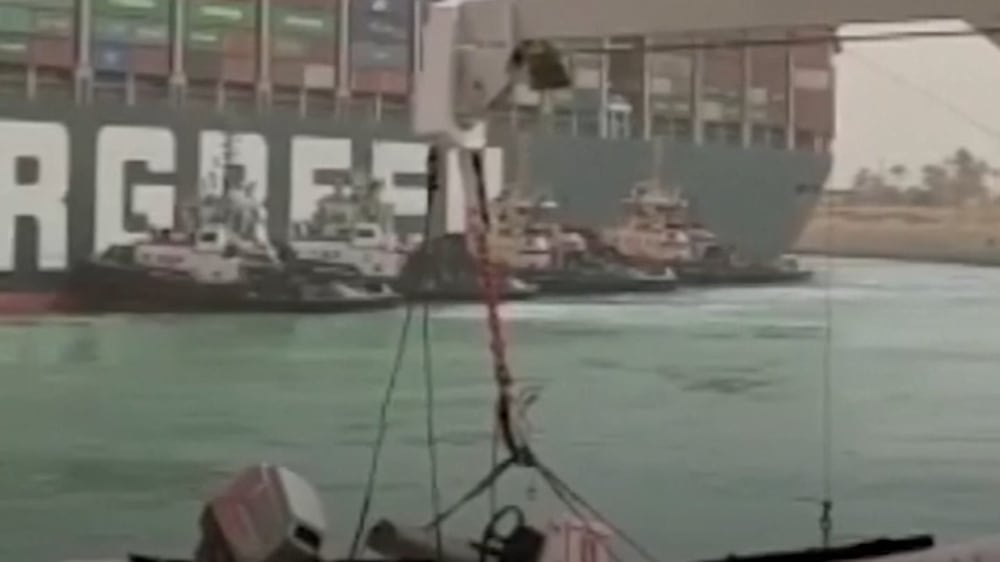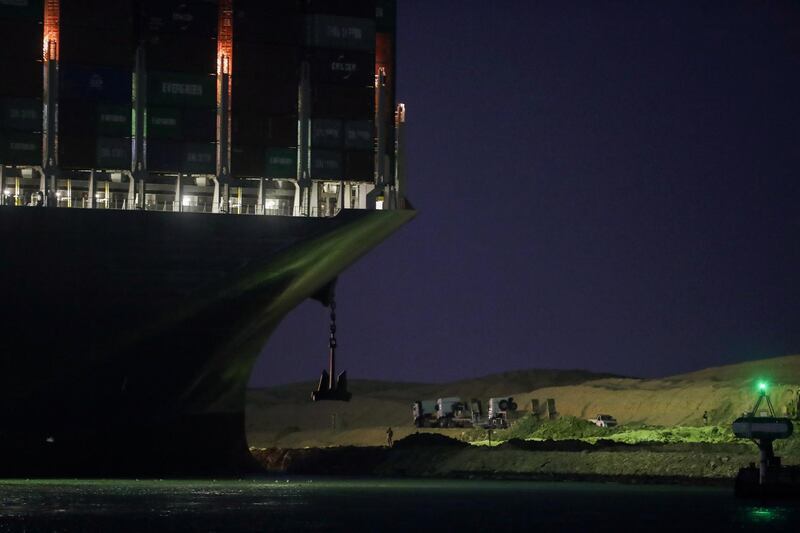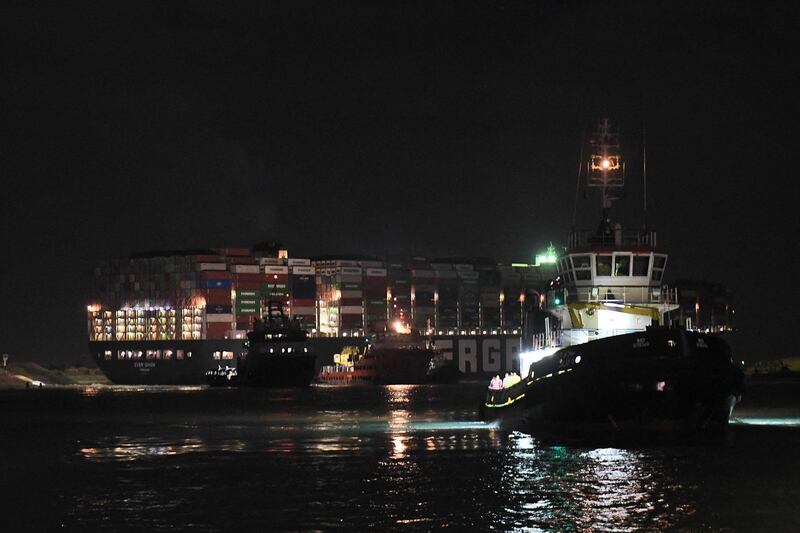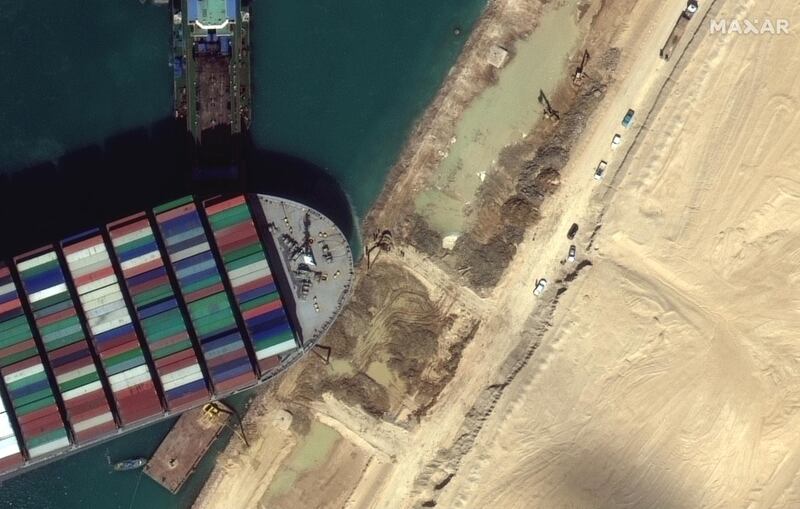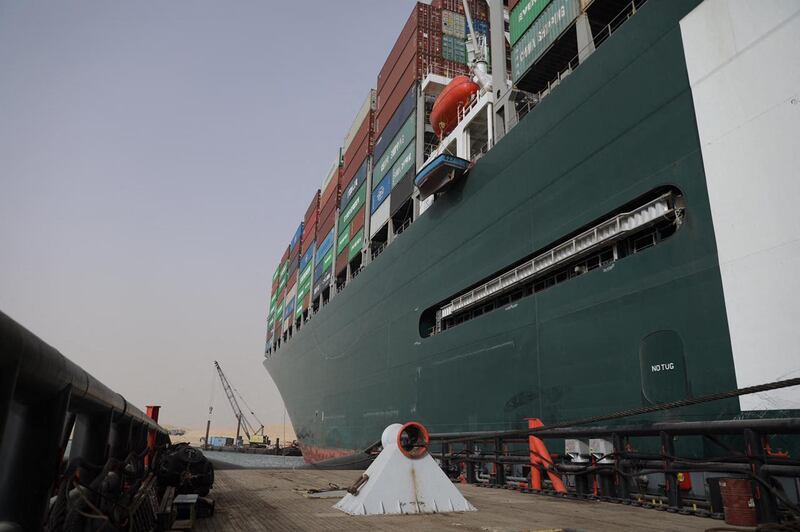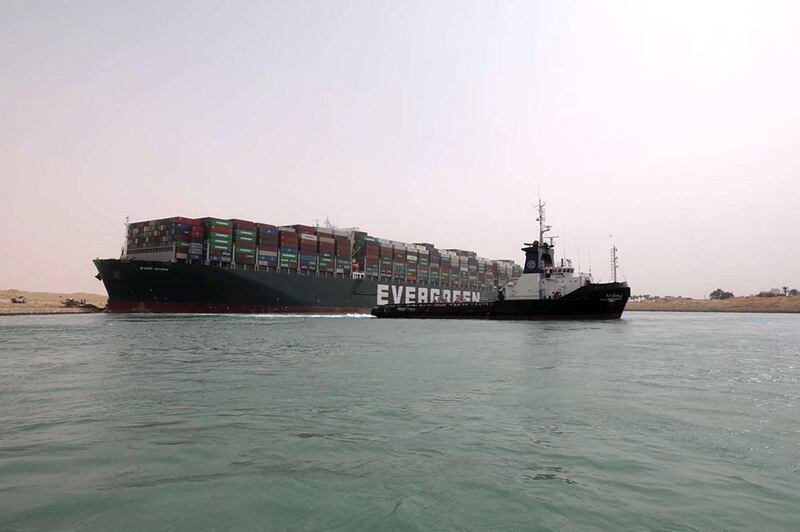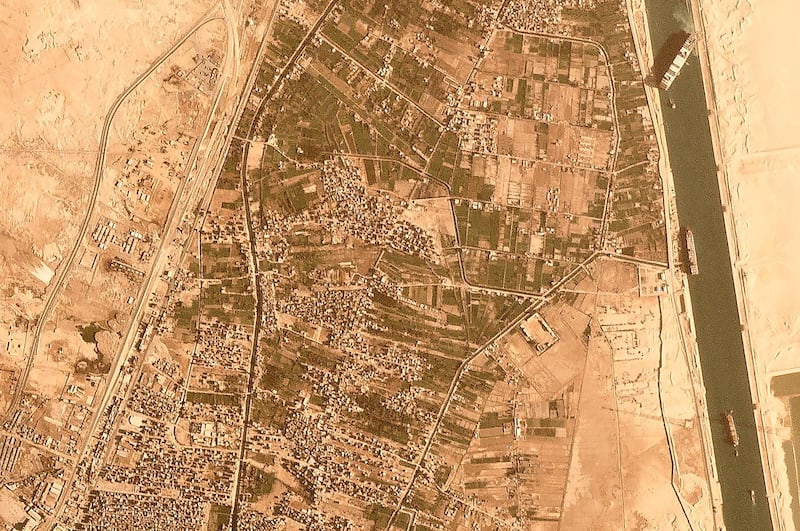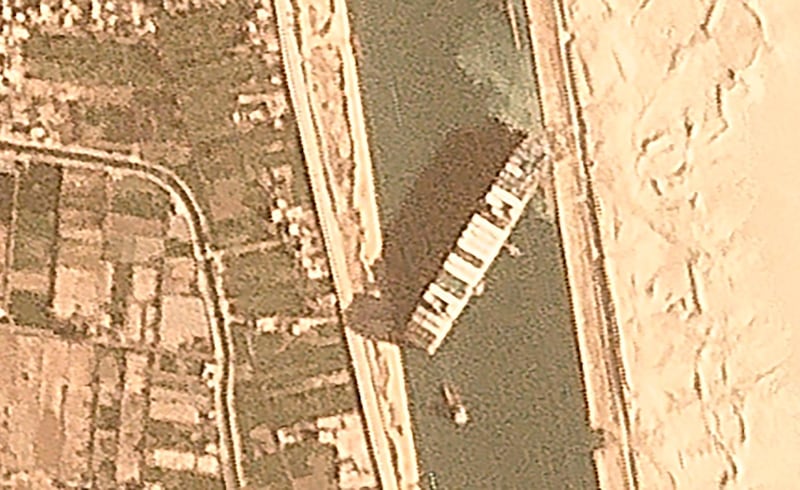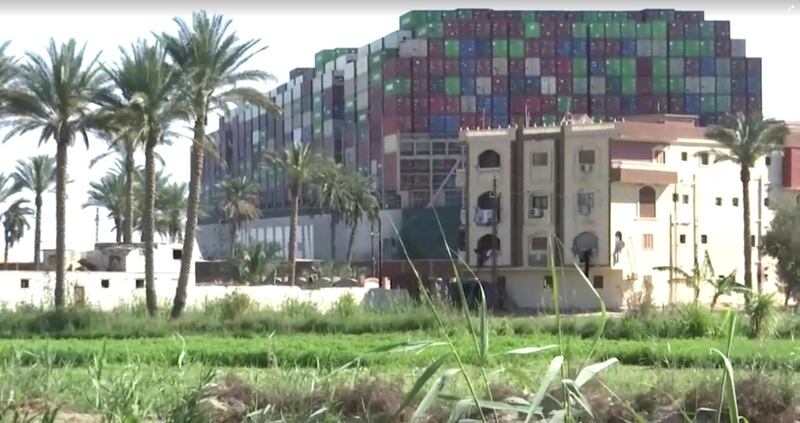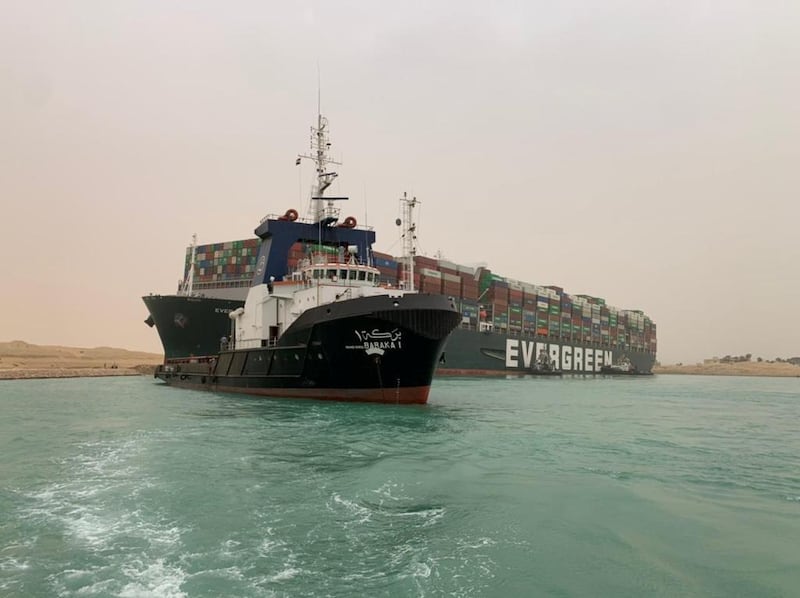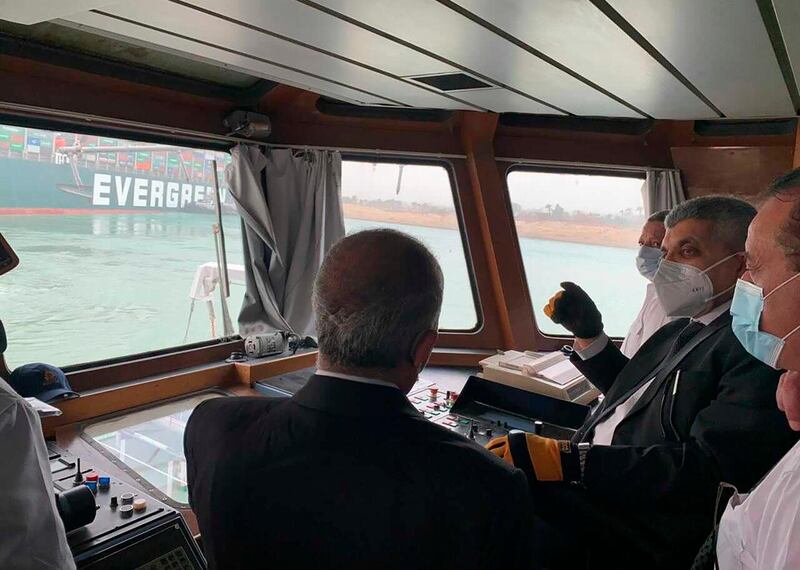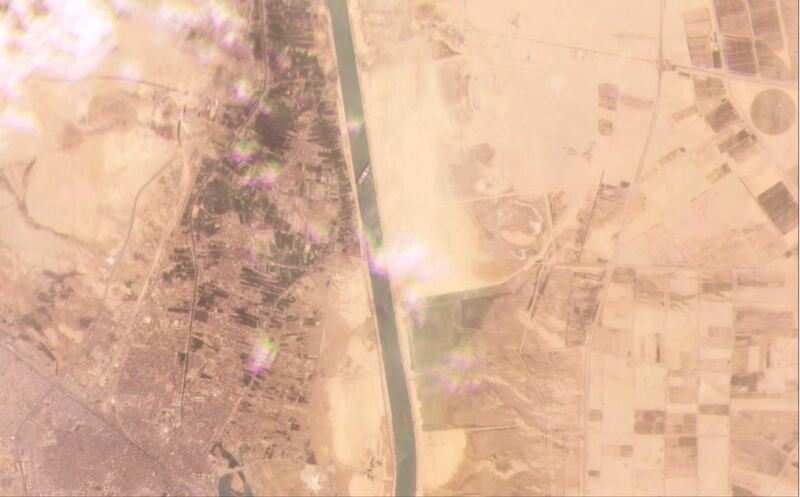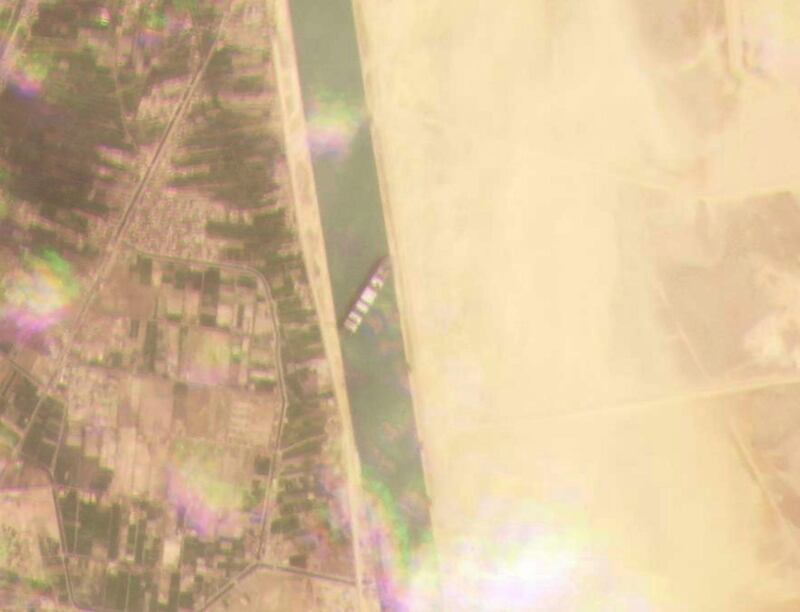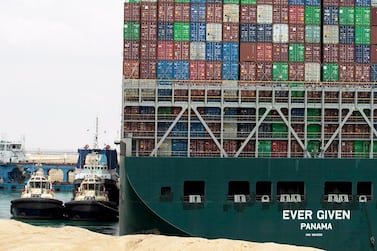Efforts to dislodge a giant container ship blocking the Suez Canal have allowed its stern and rudder to move but it still remains unclear when the vessel will be refloated, the head of the canal authority said.
Experts have removed thousands of tonnes of ballast and brought more tugboats in an expanding effort to refloat a massive cargo ship stuck diagonally across the Suez Canal and get international trade moving again on one of the world’s most vital shipping lanes.
Admiral Osama Rabieh, Chairman of the Suez Canal Authority, said that 9,000 tonnes of ballast water were pumped out of the ship to lighten the 200,000-tonne, 400-metre-vessel.
Fourteen tugboats as well as dredgers are now part of the operation and they could look to unload some weight off the vessel if the current efforts are not successful, Adm Rabieh told a news conference.
Unloading some of the 18,300 containers aboard the Ever Given could only be done by other container ships with suitable cranes, he said.
“It is our last resort scenario,” said Adm Rabieh.
Where is the Ever Given - track live
He said that teams got the rudder and propeller of the Ever Given slightly working again and the stern started moving on Friday night before the operation was suspended for the night. Another effort to free the boat will soon begin but the weight of the ship, its size as well as strong tides and winds add to the difficulty of freeing the stranded ship, he said.
"We have to deal with a difficult soil, strong tides in addition to the size of the boat, its height and the large number of containers it is carrying," he said.
He declinedrefused to give a timetable for the refloating of the vessel.
“It is very difficult to give a precise time for resolving the problem,” he said.
In the meantime, ships continue to arrive at either end of the canal, waiting to pass.
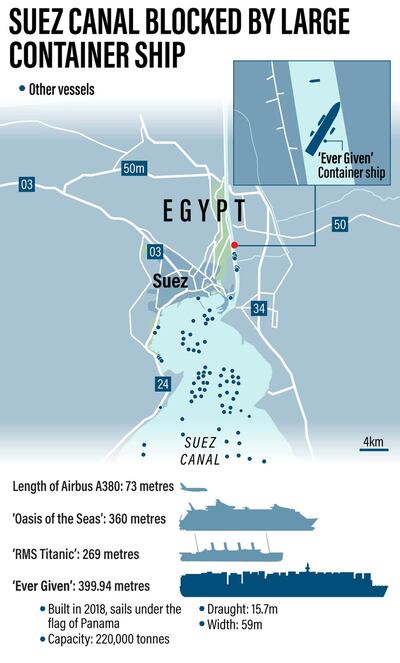
Adm Rabieh said 321 ships were now stuck in the canal and its lakes.
The Ever Given ran aground on Tuesday in a narrow stretch of the canal just north of the city of Suez after it was blown off course by strong winds during a sandstorm.
Two pilots from the canal authority were on board the Ever Given when it became stuck.
Initially, authorities and the operator said wind and a sandstorm pushed the ship off course and into the side of the canal. However, Adm Rabieh on Saturday said that bad weather was not the only cause of the Ever Given running aground and that technical or human error could have contributed.
“When it comes to big accidents like this one, there is always more than one cause. The investigation could reveal a human error or a technical fault,” said Adm Rabieh. No formal investigation into how the accident occurred will begin before the ship is refloated and traffic returns to normal, he said.
Egyptian President Abdel Fattah El Sisi said on Saturday that every effort is being made to open the vital global trade route.
US Navy experts, meanwhile, were expected to join teams already trying to refloat the ship.
These are from Japan's Nippon Salvage and Smit International, a Dutch maritime salvage company founded more than 150 years ago that has recovered vessels following some of the worst disasters at sea.
Smit International is known for working on technically challenging salvage operations.
These include the Russian submarine Kursk, which sank in 2000 in the Barents Sea, with the loss of all 118 crew; cruise liner Costa Concordia, which struck rocks in the Mediterranean in 2012, resulting in 32 deaths; and the Herald of Free Enterprise ferry, which sank near Belgian port of Zeebrugge in 1987, with 193 fatalities.
The Suez Canal Authority has welcomed US assistance.
"We are tracking the situation very closely," White House Press Secretary Jen Psaki said on Friday in Washington, noting that the Suez Canal blockage was affecting energy markets.
“As part of our active diplomatic dialogue with Egypt, we’ve offered US assistance to Egyptian authorities to help reopen the canal,” Ms Psaki said.
Before Adm Rabie's news conference in Suez, Bernhard Schulte Shipmanagement (BSM), the ship's technical manager, said efforts are being stepped up to free the Ever Given.
"The focus now is on dredging to remove sand and mud from around the port side of the vessel’s bow.
"In addition to the dredgers already on site, a specialised suction dredger is now with the vessel and will shortly begin work. This dredger can shift 2,000 cubic metres of material every hour," BSM said.
Canal authorities say nearly 20,000 cubic metres of sand must be dredged from around the ship in order for it to move.
At a press conference in Japan on Friday, Yukito Higaki, president of Shoei Kisen, which owns the Ever Given, said there were no signs of damage to its engines and instruments.
"The ship is not taking water. There is no problem with its rudders and propellers. Once it refloats, it should be able to operate," Mr Higaki said, according to the Asahi Shimbun.
Workers were hoping to remove the ship as early as Saturday evening, Tokyo time, he said.
"We are continuing work to remove sediment as of now, with additional dredging tools," Mr Higaki said, according to the Nikkei Asia.
Satellite photographs released by the canal authority show Ever Given's bow touching the eastern bank, while its stern appears to be lodged against the western bank.
Blocked Suez impact on international shipping
The blockage of the Suez, which links the Mediterranean and the Red Sea, has left hundreds of ships on both ends of the trade route waiting to pass through.
Some of those that were not already in the canal when the Ever Given ran aground are opting to take the much longer route around South Africa's Cape of Good Hope to Europe or Asia.
However, Adm Rabieh said the current crisis would not take away the edge of the Suez Canal as the shortest and more economic route between Asia and Europe.
“The route around the Cape of Good is not safe,” he said, alluding to sea piracy off the eastern coast of Africa.
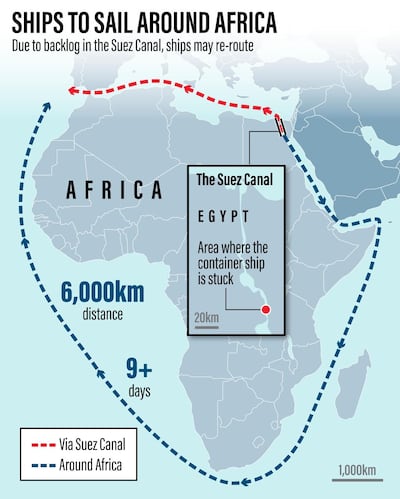
The effect of delays has doubled shipping costs for oil-related products since the ship ran aground, experts said.
The blockage could cost global trade $6 billion to $10bn a week, a study by German insurer Allianz showed on Friday.
"The problem is that the Suez Canal blockage is the straw that breaks global trade's back," the study's authors wrote.
